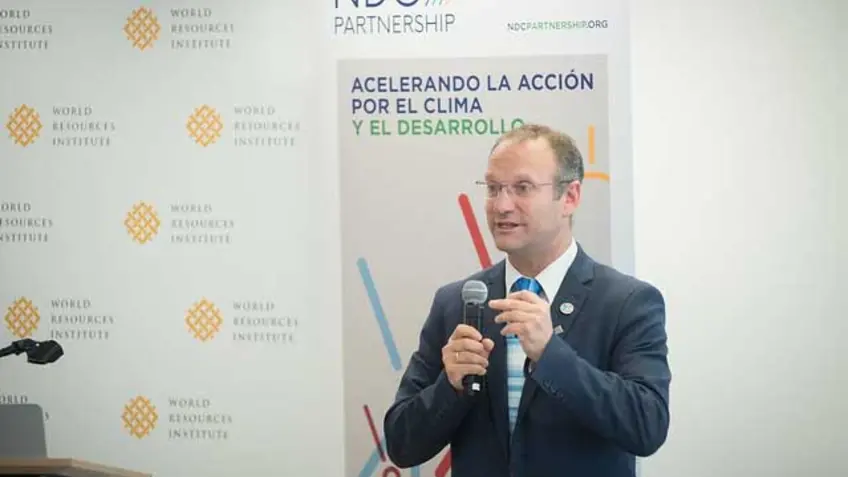Key Takeaways from COP25 Champion Gonzalo Muñoz Abogabir’s Remarks About Chile’s Climate Priorities
On 2 May 2019, Gonzalo Muñoz Abogabir, who was recently appointed to the role of Chile’s High-Level Climate Action Champion by President Sebastián Piñera, spoke at an event co-organized by the NDC Partnership and World Resources Institute about priorities for the UN Climate Conference COP25, taking place in Santiago this December.
Even though he has only been in the role for a few weeks, Muñoz said that what is expected from him is “bringing a new vision to probably the most urgent topic that we’re facing as humanity.” As a result, he said, “we need to take action urgently.” Chile has laid out several priorities for this year’s conference, including an increased focus on the critical role that oceans and biodiversity play in mitigating against and adapting to the effects of climate change.
As the founder of TriCiclos, Muñoz brings the perspective of a businessman to the conversation.
Here are 3 takeaways from Muñoz’s remarks:
- We are behind schedule.
If we are going to achieve the overall goal of keeping global temperature rise this century below 2 degrees Celsius above pre-industrial levels, efforts need to be accelerated. That means not only action on mitigation, but also on adaptation. Most of the countries in the world are on an insufficient track, he said, which is something that we need to urgently change.
- Small countries can make a difference.
While Chile may not seem like a relevant player with regard to current emissions, Muñoz says, “we don’t care about that; we need examples.” Furthermore, if other similarly-sized countries follow Chile’s lead, the impact would be major as they collectively contribute to 25 percent of global emissions. In leading by example on changing the way the country acts, Muñoz says that they can dream of a future where other low emitting countries see what is possible, building momentum that will spread from south to north.
- Market-based solutions are good for both business and politics.
On a national level, Chile has been moving towards renewable sources of power very quickly as a result of the government promoting market-based solutions. Today, a substantial and growing part of the national electricity generation comes from renewable energy sources, and their progress in this field over the past decade has been remarkable. This is truly a success story for how Chile has found a way to align the country’s political and business interests toward climate action.
Similarly, Muñoz says, Chile has moved very quickly towards understanding the problem of how to effectively manage waste. Chile has developed a “circular economy” program to reduce overall waste, including the signing of a “plastic pact” focused on ensuring that plastics are safely reused, recycled, or composted into new packaging and products. Now they are starting to address the problem of organic waste, looking to reduce waste or capitalize on the opportunity provided by converting it to clean energy.
As they shift their energy consumption and generation methods, Muñoz described the country’s dream as getting to a point where they can cover all of their own energy needs using clean and renewable power sources while running a surplus which they can export to South America
“This can no longer be a discussion where the citizens aren’t engaged,” he said.
Chile joined the NDC Partnership in November 2016 as one of the earliest members, and the Partnership stands ready to support Chile as host of COP25. Pablo Vieira, Global Director of the NDC Partnership Support Unit, said at the event that the Partnership will be supporting Chile in updating its NDC, with institutional member, the World Bank, taking a lead role.
“Last year we supported 15 countries in completing NDC implementation plans and NDC investment plans (Partnership Plans),” Vieira said. “This is a process that involves not only the government, which is ultimately responsible for the NDC, but also the international community, sub-national governments, the private sector, and all relevant stakeholders.”
“We have learned that for successful implementation of NDCs, it is fundamental to have high-quality information, as well as realistic and implementable actions, to have broad support from society and across government. These are requirements also for increased ambition,” he added.
Watch the event video on the NDC Partnership’s Facebook page.
This blog was written by Christa Lanning, Events Associate for the NDC Partnership Support Unit.
